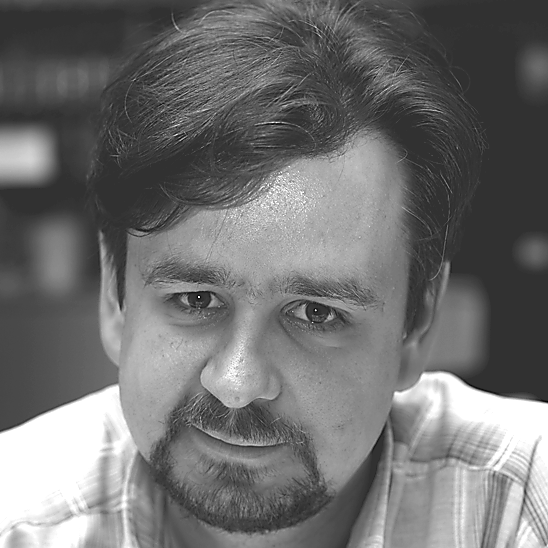
#intelligent building
What is an intelligent building?
What definition would you use to describe the term intelligent building?
Roman Vroblevskiy, Director of the Automatic Control Systems Department
YORK, a Johnson Controls company, Russia
The debate on the topic of «What is an intelligent building» has been going on for the past few years.
Some suggest using Western definitions from a quarter of a century ago, while others suggest their own, modern ones.
I prefer to use the definition developed by the Committee on Intelligent Buildings of the Association of Building Engineers: «An intelligent building is one that provides an optimal living environment that is adaptive and cost-effective throughout the entire life cycle of the building, from design to disposal.»
Alexander Golyshko, Chief Expert, COMSTAR – United TeleSystems, JSC
A building in which all elements are combined into a single information and communication environment that allows the operational and consumer characteristics of the building to be transformed using the appropriate control system.

Yuri Korolev, President of the ICS Group of Companies:
«Innovations plus effective process management for maximum return on investment.» Toronto, 1895.

Andrey Lvov, Head of the Automation Department at AHI:
An intelligent building is a building that meets the requirements of the user and owner at the optimal price for them in terms of capital and operating costs.
Vladimir Novikov, Commercial Director of Intertechproekt
FROM, from a technical point of view, — this is necessarily an integrated complex of high-class engineering systems, allowing to deliver to the consumer, correctly and easily take into account all types of resources (water, air, cold, heat, information space, etc.) for each consumer separately, allowing to easily and without significant alterations modify, change systems to specific requirements of consumers of IZ.

Ivan Redin, Executive Director of OJSC «MZTA»:
A modern building, in which the tasks of comfort and energy saving are comprehensively ensured.

Vladimir Smirnov, Executive Director of the Department automation
and dispatching of JSC NPO SEM:
A modern building that meets the basic requirements for the safety of stay and living conditions of people.

Alexey Shcherbakov, Technical Director of GC Inpred:
An intelligent building is a complex of engineering equipment of a building, hardware and software, necessary and sufficient for effective management of the building, rational use of human and energy resources, with the ultimate goal of reducing operating costs while simultaneously increasing the level of comfort and safety.
How to assess whether a particular building is intelligent? After all, this requires a set of criteria by which the assessment will be conducted. Is it worth developing a «star» scale for intelligent buildings?
R.V. Vroblevsky:
Today, the market for intelligent buildings in Russia is highly fragmented. Buildings that claim the right to be called «intelligent» differ significantly from each other, and this is not due to the lack of evaluation methods.
For most of these buildings, «intelligence» has never been one of the primary criteria, but has existed as a secondary application.
When constructing new buildings, the first thing they think about is the architecture, location, and much less often about the efficient operation of the building after the end of the construction stage.
Therefore, at this stage it is more important to educate the consumer, explain the advantages that the introduction of intelligent technologies provides, and create a conscious demand for intelligent solutions.
And when intelligence deservedly becomes one of the priority requirements for the construction of a building, we can return to the issue of distributing «stars».
A.V. Golyshko:
I think the scheme will be similar to that used in hotels, but more complex.
Each star is an integral indicator of the controllability of each service — elevators, ventilation, heating, lighting, information flows. After all, the intelligence in a building is distributed, and if there is no, for example, well-controlled ventilation, then good lighting will hardly entice.
Yu.Yu. Korolev:
It will be difficult to come up with «stars» for IZ: too many methods will have to be used and they will have to be changed too often.
It is easier to develop a list of “expert properties” (consumer, technological, financial and others) for evaluation and evaluate the properties quantitatively.
This will result in a method for evaluating the “closeness” of the Project under consideration to the “current ideal” (CI), since CI is a goal, but not a product.
Tomorrow the idea of the “ideal” may change, so the quantitative characteristics may change as well.
A.V. Lvov:
Based on the answer to the first question, it is necessary to formulate the requirements of the user and the owner; determine capital costs and operating costs for each requirement.
It is difficult to develop such a scale. More precisely, it can be developed, but solutions for a building with the same degree of intelligence will satisfy one customer, but not another.
V.V. Novikov:
I think that for each customer (the one who wants to implement IZ for himself) the concept of IZ is individual. The term IZ is good in that it allows you to optimize the set of functions and the level of integration for each consumer. It will be very difficult to create such a scale.
I.V. Redin:
There is no need to develop such criteria. There are already existing criteria for energy saving and comfort. It is these criteria that determine the modernity and, consequently, the «intelligence» of the building.
V.M. Smirnov:
It is not practical to develop such a scale of indicators, since the set of functions implemented is determined by the main purpose of the building, the amount of engineering equipment, the requirements of regulatory documents and the financial resources allocated for their implementation.
And the very purpose of creating a building equipment management system, as it seems to me, belongs to the category of creating a reliable and safe building operation system, and not achieving some intelligence.
A.A. Shcherbakov:
In my opinion, assigning stars to intelligence is pointless.
The main criteria are ease of use, cost reduction and failure-free operation. And they are still subjective, since much depends on the service personnel.
Should the term IZ be developed further in Russia, or should we follow the Western path, where the term IZ has been largely replaced by «Building Automation and Management Systems»?
R.V. Vroblevsky:
Everything is simple here. Both terms denote very specific concepts, which determines their use.
When the term «Building automation systems» is used in literature, it refers to electronics and systems that control the building. However, this is only one of the building systems, and it would be incorrect to call it an «intelligent building».
Moreover, not every building equipped with an automation system can be called intelligent.
Unfortunately, in Russia the concept of an intelligent building has been somewhat discredited in recent years, since it was used by many companies to promote some of their products and services, mainly related to building automation.
This is where the confusion comes from.
I believe that the term «Building automation and control systems» should be used for control systems, and for buildings designed and constructed using all modern technologies — an intelligent building.
A.V. Golyshko:
I believe that the communication services complex present in the building should be considered as a mandatory element of a modern IZ. Moreover, it can be used to control all other IZ systems.
Yu.Yu. Korolev:
In the West, there has never been talk of replacing IZ with SAiUZ! This is false information.
IZ is one concept, SAiUZ is a completely different one.
These concepts do not fit into each other, do not explain each other, do not contradict each other.
Unfortunately, IZ is a subject for discussion in an incompetent marketing environment.
A.V. Lvov:
In addition to the term «Building Automation and Management Systems», the term BEMS (Building Energy Management system) is used — especially in the UK. I think that since the term intelligent building has appeared and is popular, let it be.
V.V. Novikov:
IZ is Automation and Dispatching with a face (individual for each customer), so it should not be replaced.
I.V. Redin:
It does not matter what term to use to describe this topic. The main thing is the result. In Russia, it is necessary to develop the implementation of modern comfort and energy saving systems, automation and dispatching.
V.M. Smirnov:
In my opinion, the terms «intelligent building» and «smart home» were not widely used among installation companies.
People who describe, in the form of specific technical specifications, the main functions assigned to the engineering equipment control system, understand that the level of intelligence cannot be defined in this document, since it is determined primarily by the understanding and desire of the Customer.
This can be either a “stick-rope” or a complex software and hardware complex integrating the control of all engineering systems of the building.
A.A. Shcherbakov:
Let me answer with a quote from the Great Encyclopedic Dictionary: “Intellect (from Latin intellectus) — knowledge, understanding, reason, ability to think, rational knowledge.”
None of the currently existing automation systems meet this definition.
The loud term «Intelligent Building» misleads many investors and customers. I prefer the term «Building Management System».
Today, the building automation market is full of different technologies and equipment. What promising technical directions, potentially dominant in the near future, could you highlight?
R.V. Vroblevsky:
In my opinion, the following technologies will be the most promising in the near future: energy-efficient control algorithms and technical solutions; open protocols, including BACnet; wireless technologies.
A.V. Golyshko:
Those that would support any engineering systems.
Yu.Yu. Korolev:
Successful companies will dominate, but not technologies. I would like to see a new type of multi-disciplinary companies as leaders, namely «System contractors» who really understand IZ as a GOAL and create high-quality «Synergistic Integral Projects» in the «AES» scheme (architecture-engineering-construction).
A.V. Lvov:
In my opinion, all manufacturers will try to support open protocols BACnet, Lon, MOD-Bus, as well as Internet technologies for SCADA systems.
V.V. Novikov:
Most likely, this is the unification of data exchange buses to simplify the integration of systems.
I.V. Redin:
Building systems based on a single TCP/IP protocol.
V.M. Smirnov:
It is already obvious that the future belongs to network technologies with open information exchange protocols.
A.A. Shcherbakov:
It seems to me that the most reasonable and promising way to build systems is as follows: control and automation level based on the BACnet protocol; field level — LON, KNX; energy consumption monitoring devices — M-bus, Modbus.
Many people talk about the need to develop uniform standards for IZ/SAUS. What priority tasks should such regulatory documents solve?
R.V. Vroblevsky:
Individual standards and documents on various aspects of design and construction have existed for a long time. It would be very timely to reconsider the approach to design itself (so that concept development, architectural and engineering design would be closely interrelated), as well as standards for mandatory equipment of buildings under construction.
A.V. Golyshko:
First, it is necessary to legalize IZ, then create an image of it as a mandatory element of a modern city.
Yu.Yu. Korolev:
It is necessary to replace almost all technical regulations, if only because they do not control anything and do not affect anything. That is, the economy is neither cold nor hot from them.
I suggest that before we start writing the rules, we classify all the elements of modern buildings and create a clear and modern classifier (for example: OCCS — (overall construction classification system), «Int3P»).
When the functional-semantic classification is ready, we can move on to regulations and other laws.
A.V. Lvov:
We need to implement existing international standards, adapting them to our reality.
It is necessary to structure systems by the purpose of buildings and regularly publish a review of installed projects to meet investors' expectations of the actual efficiency of buildings after completion of construction.
This is possible if such authoritative communities as BIG-RU and «ABOK» (now more of a club of manufacturers) find a common language with the investment and operational business.
The answer to the question of investors and managers «What to compare with?» is the main task of the standards developers.
V.V. Novikov:
Specification of norms and rules for the definition of IZ (or high-class building).
For example, how much air, electricity and everything else should be supplied per consumer so that the building is of a high category (in our case, IZ), how to account for resources (accounting standards), what is the minimum required set of resources that a building should provide and how to distribute and account for them so that the building is intelligent.
I.V. Redin:
It is necessary to develop a common methodology for creating buildings, in accordance with which standards are developed that should cover not only equipment and automation solutions, but also issues of equipping buildings with engineering systems, and requirements for the design of the building itself.
V.M. Smirnov:
At present, there is a certain set of regulatory documents that define the basic requirements that must be implemented for safe human life.
A serious installation company, while complying with the requirements of regulatory documents for the same money, tries to squeeze everything out of the equipment and software used so that each new project is more perfect than the previous one.
Limiting this activity by introducing certain regulatory documents in the conditions of free competition seems inappropriate.
A.A. Shcherbakov:
The regulatory documentation must define the volume and quality of the documentation and software transferred to the customer.
Freely programmable controllers are now widely used, and installers are in no hurry to hand over the controller programs developed for them to the customer.
All this has a negative impact on the quality of operation of the facility and its modernization, and slows down the process of integrating equipment from different manufacturers.
Regulatory documents on building management systems should regulate this process.
In what promising areas of construction should we expect the implementation of the IZ concept?
R.V. Vroblevsky:
The IZ concept will be implemented where the investor is interested in the efficient operation of the facility after completion of construction. Today, there are companies on the market that build buildings not for sale, but for the purpose of further operation. I would expect the most «intelligent» projects from them.
A.V. Golyshko:
Business centers, hotels and luxury housing.
Yu.Yu. Korolev:
The directions of regional planning for the purposes of sustainable development of territories will be promising. It is this kind of «general planning» that will create the best prerequisites for the development of IZ and related architectural, construction and engineering technologies.
A.V. Lvov:
Based on the answer to the first question, all areas of construction need to implement the IZ concept.
V.V. Novikov:
Elite housing, class A and B offices, and in the future, class C, since the cost of IZ will decrease every year.
I.V. Redin:
Buildings and structures of transport infrastructure, retail and office real estate, hotels.
V.M. Smirnov:
Almost everything where the construction requires the installation of 10 or more units of engineering equipment. If earlier the ACS of the building were used mainly in the construction of business centers, large shopping centers, now with the introduction of energy-efficient technologies there is a need for ACS in housing construction.
A.A. Shcherbakov:
IZ will be implemented at sites saturated with complex engineering systems that require interconnected and trouble-free operation.
And this is hotel, office and business construction.
In the near future, the introduction of such systems in housing and industrial construction is unlikely.
In what cases is it profitable for an investor to build «intelligent buildings»? What is holding back the development of IZ today? What are the solutions to the problems?
R.V. Vroblevsky:
The construction of intelligent buildings is a matter of long-term investments and an integrated approach to design.
As long as «intellectualization» is carried out at the final stages of design, and builders make a profit from cutting specifications for assembly, the customer will not receive IZ and will operate the resulting semi-finished product at exorbitant prices.
The path for an intelligent building should be as follows: a competent customer — a professional concept/project — construction control — professional operation.
A.V. Golyshko:
When the investor will operate and maintain the building.
Yu.Yu. Korolev:
It is always profitable for an investor to build an IZ. He just never tried to understand what it is. When he does, you won’t be able to drag him away by the ears. If only a suitable contractor could be found. But that’s a problem for now.
A.V. Lvov:
Based on the answer to the first question, it is always profitable for an investor to build an IZ. The restraining factors are: fear of the term IZ itself, lack of demand and absence of a consulting business in the full sense of the word in Russia, and a shortage of specialists.
V.V. Novikov:
In any case, it is profitable for an investor to build an IZ, since there are real methods for bringing the cost of an IZ to the cost of a regular building. The deterrent is the supposedly high cost of an IZ. This is not true.
I.V. Redin:
In the event that an IZ provides an additional economic effect. If investments pay off, then it does not matter what the size of these investments is.
V.M. Smirnov:
It is always profitable if the investor remains the owner or operates the building after the construction is completed. The widespread implementation of promising technologies for monitoring and managing engineering equipment is only held back by a lack of understanding of the real cost. The terms «intelligent building» and «smart home» only add to the confusion in the minds of investors.
A.A. Shcherbakov:
First of all, owners of buildings and investors are interested in the construction of IZ, for whom the payback period of capital investments in construction is important.
It is no secret that an integrated building management system requires large investments at the initial stage of construction.
Most investors and developers today are only interested in the cost of construction, and not in the savings during operation, which allows them to return the invested money in 5-7 years.
This situation is directly related to the unstable economic situation in the country.
How much does the construction budget increase when implementing the IZ concept and what are the payback periods for the project?
R.V. Vroblevsky:
The cost of implementing a particular technology varies for each specific case.
In general, to reduce implementation costs and reduce the payback period, it is important to apply an intelligent approach at the stage of developing the building concept and design. With this approach, in most cases there is a real opportunity to even reduce the overall estimate for the construction of the facility.
In practice, it is often necessary to implement automation systems designed «the old way». In our experience, such systems on average increase the construction estimate by 2-5%, and pay for themselves in 1-4 years even in Russian conditions.
A.V. Golyshko:
A good, exclusively domestic question, to which a standard answer can be given: «if I knew the winnings, I would live in Sochi». Everything depends on the project and its developers.
Yu.Yu. Korolev:
IZ always reduces the budget, creating better ROI indicators. IZ has a positive effect on all budgets at different times: investment, operational (repair, resource, etc.). It is important to agree with the correct definition of IZ and stop comparing it with automation software and some controllers.
The impact of IZ on the entire project is colossal. Using IZ technology, you can create the prerequisites for obtaining significant benefits at the early stages due to the implementation of new integral principles.
A.V. Lvov:
Based on the answer to the first question, each specific building has its own indicators. In the West, the efficiency of implementing IZ systems is usually estimated based on no more than 7 years in terms of energy efficiency. But the question «what to compare with?» is the most important one, and formulating the answer to it is the main task of «BIG-RU».
V.V. Novikov:
In our experience, the budget is the same, the payback period is the same.
I.V. Redin:
I find it difficult to answer, but in any case, the payback period of the project should not exceed 5 years compared to the base case.
V.M. Smirnov:
I will not talk about the IZ, I will focus on the Automated system for monitoring and controlling engineering equipment, or «BMS».
For an average office building with an area of 15,000 sq. m., work on automating engineering equipment by means of local automation, as provided for by regulatory documents, amounts to approximately 200,000 US dollars.
The implementation of BMS in this building will require about $240,000. This minor increase in cost is mainly due to the replacement of regulators with freely programmable controllers and the purchase of network software.
Such additional investments will pay off in six months, only due to the reduction of operating personnel, not counting energy savings, etc.
A.A. Shcherbakov:
I am not an economist, but in my opinion, the implementation of a modern building management system will add no more than 1-3% to the total construction budget, depending on the purpose of the facility and its saturation with engineering systems.
In most cases, the cost of an automation system is less than 1% of the cost of construction.
The average payback period for a building management system in Russia is 7-9 years. But judging by the trends in the growth of prices for primary energy sources, we will soon approach the global 3-5 years.
What are the main technical capabilities provided by IZ systems for building owners?
R.V. Vroblevsky:
From a purely economic point of view, this is: energy savings; forecasting and significant reduction in equipment repair costs; reduction in operating costs. In addition, such systems increase the level of safety and comfort in the building; serve as a basis for reducing insurance payments.
A.V. Golyshko:
In general, any, i.e. as much as there is enough money or desire to spend it on such services. More specifically, the possibility of remote monitoring and control in order to achieve the best balance between resource savings and internal comfort.
Yu.Yu. Korolev:
The same as in buildings with ASUZ, only much cheaper.
A.V. Lvov:
The technical capabilities of IZ systems do not interest building owners. Building owners are interested in the efficiency of capital investments and current business. I hope we will be able to continue discussing technical capabilities on the pages of the bulletin — this is the topic of more than one issue.
V.V. Novikov:
Correct distribution and accounting of resources provided to users (water, air, heat, electricity, cold, telephone and computer networks, etc.). Simple and low-cost maintenance of systems (due to unification).
I.V. Redin:
The most important opportunity is to increase the level of comfort and quality of life.
V.M. Smirnov:
Creation of a reliable system for the operation of engineering equipment with its maintenance and repair not only in the event of an accident. Reduction of maintenance personnel and implementation of a set of energy-saving measures. Ensuring greater attractiveness of the building for buyers, tenants and insurance companies.
A.A. Shcherbakov:
I will list the main ones: interconnection and interaction of all engineering systems of the building to ensure maximum comfort, safety and economical use of energy resources; fast, automatic and effective response to emergency situations; the ability to remotely control the facility using existing communication channels; simplification of interaction between a person and engineering systems, which reduces the requirements for service personnel; planning and analysis of energy costs; planning preventive and maintenance work on engineering equipment based on calculating the actual operating time of this equipment, etc.
Name three objects that could be classified as IZ?
R.V. Vroblevsky:
Since there are no clear criteria, I will name several projects of our company, in which the technical solutions most closely correspond to the definition of IZ: indoor skating center in Krylatskoye, Moscow; Petmol Dairy Plant, St. Petersburg; RIO Shopping Center, Moscow.
A.V. Golyshko:
As of today, any, since there are no officially approved criteria.
Yu.Yu. Korolev:
I don't know of any. There can't be any. Because IZ is a goal, not a product.
A.V. Lvov:
Shopping center «Moscow», hotel «Golden Ring», business center «Millennium House». In terms of «automation» the buildings have different levels, but, in my opinion, the managers of these buildings approach investments and operation with intelligence and responsibility, each in accordance with the tasks set before them.
V.V. Novikov:
Shopping and business complex «Novinsky Passage», residential building Bryusov lane, vl. 19, office building Vozdvizhenka, 9/11.
I.V. Redin:
I find it difficult to answer.
V.M. Smirnov:
The following can be attributed to the most advanced BMS, implemented by the Department of Automation and Dispatching of JSC «NPO SEM», which is part of the holding «Spetselektromontazh»: office building of the company «YUKOS», Moscow, Dubininskaya 33; office building «Amber Plaza», Moscow, Shemilovsky lane. 1; the Grundfoss plant, Istrinsky district, Moscow region.
A.A. Shcherbakov:
There are no such buildings in Russia yet. I would be very happy to be wrong, but the facilities that have been built and are currently being built use the minimum possible amount of automation, mostly scattered and unrelated.
The editors express their gratitude to the experts who took part in the survey, being confident that your answers formulate a real picture of the Russian market for the construction of high-tech buildings.

Добавить комментарий